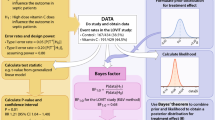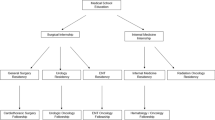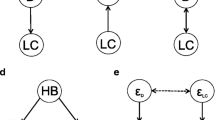Abstract
Medical research makes intensive use of statistics in order to support its claims. In this paper we make explicit an epistemological tension between the conduct of clinical trials and their interpretation: statistical evidence is sometimes discarded on the basis of an (often) underlined Bayesian reasoning. We suggest that acknowledging the potentiality of Bayesian statistics might contribute to clarify and improve comprehension of medical research. Nevertheless, despite Bayesianism may provide a better account for scientific inference with respect to the standard frequentist approach, Bayesian statistics is rarely adopted in clinical research. The main reason lies in the supposed subjective elements characterizing this perspective. Hence, we discuss this objection presenting the so-called Reference analysis, a formal method which has been developed in the context of objective Bayesian statistics in order to define priors which have a minimal or null impact on posterior probabilities. Furthermore, according to this method only available data are relevant sources of information, so that it resists the most common criticisms against Bayesianism.
Similar content being viewed by others
Notes
While Reference analysis is not the only available proposal with which one may establish objective priors, it is certainly a good case study being it a major approach in this field.
It is useful to emphasize that in the context of Bayesian statistics
probability is always a function of two arguments, the event E whose uncertainty is being measured, and the conditions C under which the measurement takes place; “absolute” probabilities do not exist. In typical applications, one is interested in the probability of some event E given the available data D, the set of assumptions A which one is prepared to make about the mechanism which has generated the data, and the relevant contextual knowledge K which might be available. Thus, Pr(E|D, A, K) is to be interpreted as a measure of (presumably rational) belief in the occurrence of the event E, given data D, assumptions A and any other available knowledge K, as a measure of how “likely” is the occurrence of E in these conditions (Bernardo 2003, p. 4).
The reader may refer also to Douglas (2009), where eight different senses of scientific objectivity have been identified.
These are discussed in detail in Sprenger (2017).
The following discussion is heavily influenced by Bernardo and Ramon (1998). Furthermore, it is important to note that this method is invariant under re-parametrization and avoid by construction the issues affecting the principle of insufficient reason.
Reference analysis is just a specific objective method to minimize the subjective component of Bayesian statistics, and other methodologies are also available, e.g. one should consider Jeffreys (1961), Jaynes (1968). It is important to stress that Jeffreys’ priors and reference priors are equivalent in the case of one-dimensional parameters, while they diverge in the multidimensional case.
The reader should refer to Soofi (1994) for a useful introduction to the technical notion of information applied in statistics.
References
Astin JA, Harkness E, Ernst E (2001) Distant healing. Ann Intern Med 132(6):903–910
Bernardo JM (1997) Non-informative priors do not exist. J Stat Plan Inference 65:159–189 (with discussion)
Bernardo JM (2003) Bayesian statistics. In: Viertl R (ed) Probability and statistics. Encyclopedia of life support systems (EOLSS). UNESCO, Oxford
Bernardo JM, Ramon JM (1998) An introduction to Bayesian reference analysis: inference of the ratio of multinomial parameters. J R Stat Soc Ser D 45:1–35
Cartwright N (2007) Are RCT the gold standard? BioSocieties 1:11–20
Cartwright N (2010) What are randomised controlled trials good for? Philos Stud 147(1):59–70
Clarke B, Gilles D, Illari P, Russo F, Williamson J (2014) Mechanism and the evidence hierarchy. Topoi 33(2):339–360
Douglas H (2009) Science, policy, and the value-free ideal. University of Pittsburgh Press, Pittsburgh
Efron B (1986) Why isn’t everyone a Bayesian? Am Stat 40(1):1–5
Emslie G, Rush A, Weinberg W, Kowatch R, Hughes C, Camody T, Rintelmann J (1997) A double-blind, randomized, placebo-controlled trial of fluoxetine in children and adolescents with depression. JAMA Psychiatry 54(11):1037–1037
Gelman A, Hennig C (2017) Beyond subjective and objective in statistics. J R Stat Soc Ser A 180:1–31
Jack Lee J, Chu CT (2012) Bayesian clinical trials in action. Stat Med 31(25):2955–2972
Jaynes E (1968) Prior probabilities. IEEE Trans Syst Sci Cyber 4:227–291
Jeffreys H (1961) Theory of Probability, 3rd edn. Oxford University Press, Oxford
Kaptchuk T (2001) Distant healing. Ann Intern Med 134(6):532–533
Kass R, Wasserman L (1996) The selection of prior distributions by formal rules. J Am Stat Assoc 91(431):1343–1370
Kincaid H, Dupré J, Wylie A (2007) Value-free science: ideals and illusions?. Oxford University Press, Oxford
Leibovici L (2011) Effects of remote, retroactive intercessory prayer on outcomes in patients with bloodstream infection: randomised controlled trial. Br Med J 323:1450
Moyé LA (2008) Bayesians in clinical trials: asleep at the switch. Stat Med 27(4):469–482
Porter TM (1996) Trust in numbers: the pursuit of objectivity in science and public life. Princeton University Press, Princeton
Soofi E (1994) Capturing the intangible concept of information. J Am Stat Assoc 89(428):1243–1254
Sprenger I (2017) The objectivity of subjective Bayesianism, pp 1 – 27. http://philsci-archive.pitt.edu
Stegenga J (2011) Is meta-analysis the platinum standard for evidence? Stud Hist Philos Sci C 42(4):497–507
Syversveen AR (1998) Non-informative Bayesian priors. Interpretation and problems with construction and applications. Preprint Stat 3:1–11
Teira D (2011) Frequentist versus Bayesian clinical trials. Handbook of the philosophy of science. Philos Med 16:255–298
Teira D, Reiss J (2013) Causality, impartiality and evidence-based policy. In: Chao H-K, Chen S-T, Millstein R (eds) Mechanism and causality in biology and economics. Springer, New York, pp 207–224
Vandenbroucke J (2005) Homeopathy and the growth of truth. Lancet 366(9487):691–692
Whittington C, Kendall T, Fonagy P, Cottrell D, Cotgrove A, Boddington E (2004) Selective serotonin reuptake inhibitors in childhood depression: systematic review of published versus unpublished data. Lancet 363(9418):1341–1345
Wijeysundera D, Austin P, Hux J, Beattle W, Laupacis A (2009) Bayesian statistical inference enhances the interpretation of contemporary randomized controlled trials. J Clin Epidemiol 62(1):13–21
Worrall J (2010) Evidence: philosophy of science meets medicine. J Eval Clin Pract 16(2):356–362
Acknowledgements
A. Oldofredi is grateful to the Swiss National Science Foundation for financial support (Grant No. 105212-175971).
Author information
Authors and Affiliations
Corresponding author
Rights and permissions
About this article
Cite this article
Andreoletti, M., Oldofredi, A. We are All Bayesian, Everyone is Not a Bayesian. Topoi 38, 477–485 (2019). https://doi.org/10.1007/s11245-018-9554-4
Published:
Issue Date:
DOI: https://doi.org/10.1007/s11245-018-9554-4




